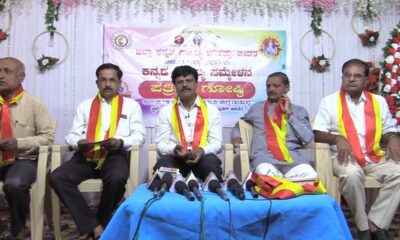india
India: 628 New COVID Cases, Active Caseload 4,054
COVID-19: total at 4.5 Cr. Active cases: 4,054. Deaths: 5.33 L. Recoveries: 4.44 Cr. Recovery rate: 98.81%. Vaccines: 220.67 Cr doses.

India reported an increase of 628 new COVID-19 cases in a single day, resulting in a surge in the active caseload, which now stands at 4,054, as per the latest data from the Union Health Ministry.
The total number of fatalities reached 5,33,334 (5.33 lakh), with one new death reported from Kerala in the preceding 24 hours, according to the information updated at 8 am. Additionally, Beed recorded three new cases of coronavirus.
The overall COVID-19 case tally in the country has reached 4,50,09,248 (4.50 crore). The number of individuals who have successfully recovered from the disease has risen to 4,44,71,860 (4.44 crore), contributing to a national recovery rate of 98.81 percent, as stated on the Health Ministry website.
The case fatality rate remains at 1.19 percent. Notably, the Health Ministry website indicates that a total of 220.67 crore COVID-19 vaccine doses have been administered across the nation.
india
Celebrating Progress: PM Modi Triumphantly Launches New Pamban Bridge in Tamil Nadu as CM Stalin Opts Out
On Sunday, April 6, 2025, Prime Minister Narendra Modi stood at the edge of Rameswaram, Tamil Nadu, to unveil a game-changer: the new Pamban Sea Bridge. This isn’t just any bridge—it’s India’s first vertical-lift railway sea bridge, a sleek, modern marvel linking the sacred island of Rameswaram to the mainland. With a wave of his […]
On Sunday, April 6, 2025, Prime Minister Narendra Modi stood at the edge of Rameswaram, Tamil Nadu, to unveil a game-changer: the new Pamban Sea Bridge. This isn’t just any bridge—it’s India’s first vertical-lift railway sea bridge, a sleek, modern marvel linking the sacred island of Rameswaram to the mainland. With a wave of his hand, Modi flagged off the first train, the Rameswaram-Tambaram (Chennai) express, chugging across the bridge, while a Coast Guard ship glided beneath its raised span. For the people of Tamil Nadu, it’s a moment of pride, a symbol of progress stitching together tradition and technology.
But the day wasn’t without its drama. Tamil Nadu Chief Minister M.K. Stalin was noticeably absent from the grand event. Instead of joining the celebrations, he chose to focus on a different mission, raising eyebrows and sparking conversations across the state.
Why Stalin Skipped the Big Reveal
Stalin didn’t just miss the event by chance—he had a point to make. While Modi was busy cutting ribbons in Rameswaram, the CM was miles away, delivering a speech in Ooty at the opening of a new 700-bed hospital. But it wasn’t just a scheduling conflict. Stalin used the moment to press a bigger issue: delimitation. He’s been vocal about his concerns, urging Modi to promise Tamil Nadu that its share of parliamentary seats won’t shrink under the proposed redistricting plan. For Stalin, it’s about fairness—states like Tamil Nadu, which have worked hard to manage population growth, shouldn’t lose out, he argues.
“I’ve already told the PM I couldn’t make it due to prior commitments,” Stalin later explained, brushing off any speculation of a snub. Yet, his absence spoke louder than words, turning a day of celebration into a subtle political standoff.
A Warm Welcome and a Bridge to the Future
Modi didn’t arrive alone. Fresh from a trip to Sri Lanka, he was greeted with open arms by Tamil Nadu Governor R.N. Ravi, Finance Minister Thangam Thenarasu, and a lineup of BJP heavyweights like L. Murugan and K. Annamalai. The mood was festive, with the crowd buzzing about the bridge’s promise: faster trains, smoother travel, and a lifeline for Rameswaram’s pilgrims and residents.
Spanning 2.07 kilometers across the Palk Strait, the new Pamban Bridge replaces an aging icon from 1914. At a cost of over ₹550 crore, it’s built to last, with a vertical lift that rises 17 meters to let ships pass—a feat of engineering that’s got everyone talking. For locals, it’s more than steel and concrete; it’s a connection to the world beyond the waves.
What’s Next for Tamil Nadu?
As the train rolled out and the ship sailed through, Modi’s visit underscored a vision of growth. But with Stalin’s absence and his delimitation demands hanging in the air, the day left a lingering question: can progress on the ground bridge the political divides above it? For now, Tamil Nadu’s newest landmark stands tall, ready to carry its people into the future—one train ride at a time.
india
Congress Slams Waqf Bill as Unconstitutional, Vows to Fight in Supreme Court
In a bold move, the Congress party has announced plans to challenge the recently passed Waqf (Amendment) Bill, 2025, in the Supreme Court, labeling it a direct assault on India’s Constitution and the rights of the Muslim community.

In a bold move, the Congress party has announced plans to challenge the recently passed Waqf (Amendment) Bill, 2025, in the Supreme Court, labeling it a direct assault on India’s Constitution and the rights of the Muslim community. The legislation, which cleared both houses of Parliament after heated debates, has sparked widespread controversy, with opposition leaders arguing it undermines religious autonomy and equality.
The Waqf Bill, passed by the Lok Sabha with 288 votes in favor and 232 against, and later by the Rajya Sabha with 128 votes to 95, now awaits President Droupadi Murmu’s assent to become law. However, Congress leader Jairam Ramesh, the party’s General Secretary, took to X to declare that the Indian National Congress (INC) will soon contest the bill’s constitutionality in the nation’s highest court. “We are confident and will continue to resist all assaults of the Modi government on the principles, provisions, and practices contained in the Constitution of India,” Ramesh stated, emphasizing the party’s commitment to protecting constitutional values.
The bill introduces significant changes to the Waqf Act of 1995, including the inclusion of non-Muslim members in Waqf Boards and the Central Waqf Council—a move critics argue is discriminatory and lacks justification. Opposition leaders, including Congress and AIMIM chief Asaduddin Owaisi, have slammed the legislation for imposing arbitrary restrictions on Waqf property management, which they say violates Articles 14, 25, 26, 29, and 300A of the Constitution. These articles safeguard equality, religious freedom, minority rights, and property rights, respectively.
Opposition Leaders Rally Against Controversial Waqf Amendment Bill, Citing Threats to Muslim Rights
Congress MP Mohammad Jawed, who has already filed a petition in the Supreme Court, argued that the bill disproportionately increases state control over Waqf affairs compared to other religious trusts, such as those of Hindus and Sikhs, which enjoy greater self-regulation. The amendments also remove the Waqf-by-user doctrine—a principle upheld by the Supreme Court that recognizes properties as Waqf through long-standing religious use—further fueling concerns about the erosion of Muslim religious rights.
The debate in Parliament was intense, with the Rajya Sabha discussion stretching over 13 hours. Opposition leaders like Mallikarjun Kharge called the bill “anti-Muslim” and demanded its withdrawal, alleging it was designed to target Waqf properties for eventual privatization. “The intention behind this is questionable,” Kharge said, warning of potential communal polarization. Meanwhile, the government, led by the BJP, defended the bill as a step toward transparency and inclusivity, with Prime Minister Narendra Modi calling its passage a “watershed moment” for socio-economic justice.
The controversy has also led to political fallout, with two Janata Dal (United) leaders resigning in protest over their party’s support for the bill. As the legal battle looms, the Congress party’s challenge in the Supreme Court could set a precedent for how religious and property rights are balanced in India’s diverse democracy. Will the judiciary uphold the opposition’s claims, or will the Waqf Bill stand as a new framework for managing Muslim endowments? The nation watches closely as this contentious issue unfolds.
Karnataka
Karnataka BJP Kicks Off Overnight Protest Against Price Hikes and Muslim Quota
Led by BJP’s state president Vijayendra, the demonstration targets the Congress-led government’s recent price hikes and its controversial decision to introduce a 4% reservation for Muslims […]

Bengaluru, Karnataka: The political air in Karnataka is buzzing as the Bharatiya Janata Party (BJP) launched an overnight protest at Freedom Park in Bengaluru on Wednesday, April 2, 2025. Led by state president BY Vijayendra, the demonstration targets the Congress-led government’s recent price hikes and its controversial decision to introduce a 4% reservation for Muslims in government contracts. With emotions running high, this protest marks a bold stand against what the BJP calls a “burden on the people.”
The protest kicked off at 11 a.m. and stretched into the night, with Vijayendra slamming the Siddaramaiah government for making life tougher for everyday citizens. He pointed to the recent Rs 4 increase in Nandini milk prices—now the third hike since Congress took charge—as an “Ugadi gift” that’s left families struggling. “This government promised relief but delivered only rising costs,” Vijayendra said, vowing to keep the pressure on until the hikes are rolled back.
A Fight Against Rising Costs and Policy Shifts
The BJP isn’t stopping at milk prices. Vijayendra accused the government of jacking up water tariffs, petrol costs, and more, hitting the poor and farmers the hardest. He also took aim at the 4% quota for Muslims in public contracts, labeling it “unconstitutional” and a move that sidelines other backward classes like SCs, STs, and OBCs. “This isn’t about fairness—it’s about appeasement politics,” he argued, promising a statewide awareness campaign starting April 10 to rally public support.
The protest saw a strong turnout, with BJP MLAs, MLCs, former legislators, and district leaders joining in. Vijayendra stressed that this is just the beginning, with plans for demonstrations across all district centers on April 4 and taluk-level protests on April 5. “We’re here to fight for the people, not just make noise,” he added, urging the government to rethink its policies.
A Divided Response
While the BJP rallies its base, the Congress government defends its actions. The milk price hike, they say, supports dairy farmers by covering rising production costs, with Karnataka Milk Federation (KMF) Chairman Bheema Naik noting that prices here are still lower than in states like Gujarat or Delhi. On the Muslim quota, the government insists it’s based on socio-economic backwardness, not religion, aligning with long-standing policies under previous administrations.
Yet, the BJP remains unconvinced, accusing Congress of playing the minority card to win votes. The tension spilled into the streets of Bengaluru, with protesters chanting slogans and holding signs, creating a lively yet tense atmosphere. Police kept a close watch, ensuring the demonstration stayed peaceful as traffic flowed nearby and shops stayed open.
What’s Next for Karnataka?
This overnight protest is more than a one-night stand—it’s a signal of bigger battles ahead. With the BJP gearing up for a statewide movement, and the Congress digging in, Karnataka’s political scene is heating up. Residents are left wondering: Will the government back down, or will this spark a longer fight? For now, the focus is on Freedom Park, where voices of dissent echo into the early morning.
Stay tuned as this story develops. Whether it’s about your grocery bill or community rights, this protest could shape Karnataka’s future. Keep checking for the latest updates on price hikes, Muslim quota debates, and more!
-

 india2 years ago
india2 years ago“Major Crash of Sukhoi Su-30 and Mirage 2000 Fighter Jets in Madhya Pradesh”
-

 Sports2 years ago
Sports2 years agoWFI meetings on April 16, elections likely to be discussed
-

 india1 year ago
india1 year agoPM Modi Meets Deve Gowda for Seat Sharing Talks
-

 india1 year ago
india1 year agoBengaluru: False threat to bomb Raj Bhavan
-

 india2 years ago
india2 years ago“AIMIM to Contest 50 Seats in Upcoming Telangana Assembly Elections”
-

 Entertainment1 year ago
Entertainment1 year agoAnant Ambani: Controversy at the Ambani Pre-Wedding Bash
-

 Entertainment2 years ago
Entertainment2 years agoRajinikanth is Moideen Bhai in ‘Lal Salaam’
-

 Videos2 years ago
Videos2 years agoBidar News : Press Meet Organized By Zilla Kannada Sahitya Parishad










